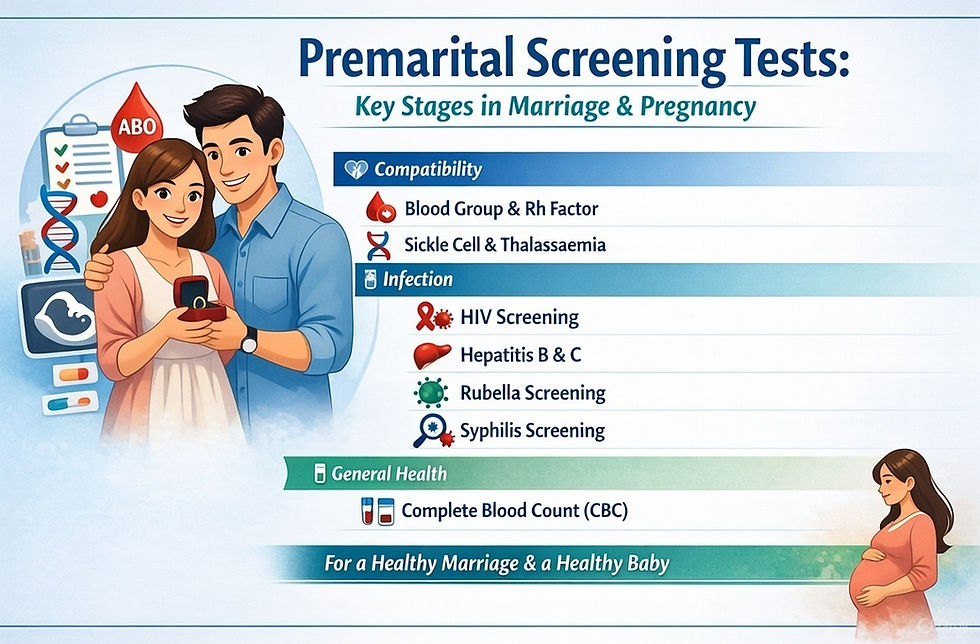Essential Cancer Health Checks for Women
- EJB
- Dec 12, 2024
- 3 min read

When it comes to women's health, proactive screening for cancer is not just a recommendation; it's a necessity. Early detection through regular health checks can significantly increase the chances of successful treatment outcomes. Here’s a detailed look at the key cancer screenings that every woman should consider, tailored by age and risk factors.
1. Cervical Cancer Screening
Who Should Get Tested: Women aged 21 to 65.
Tests Involved:
Pap Test (Pap Smear): Starting at age 21, women should have a Pap test every three years. This test checks for precancerous or cancerous cells on the cervix.
HPV Test: From age 30, co-testing with HPV (Human Papillomavirus) testing every 5 years or Pap test alone every 3 years is recommended. HPV infection is a primary cause of cervical cancer.
Why It's Important: Cervical cancer can often be prevented through vaccination against HPV or detected early with regular screenings, making it one of the most preventable cancers.
2. Breast Cancer Screening
Who Should Get Tested: Women, particularly those between 40 to 74 years, though the starting age can vary based on individual risk factors.
Tests Involved:
Mammograms: Regular screening mammograms are recommended every 1-2 years from age 45 to 54, and every 2 years for women aged 55 and older. Women with a family history or other risk factors might need to start earlier or have additional tests like MRI.
Breast Self-Exams: While routine self-exams are no longer widely recommended, being aware of changes in your breasts and reporting them to your doctor is beneficial.
Why It's Important: Breast cancer is one of the most common cancers among women, and early detection through mammography can dramatically improve survival rates.
3. Colorectal Cancer Screening
Who Should Get Tested: Screening should generally begin at age 45 for average-risk women, but earlier for those with a family history or other risk factors.
Tests Involved:
Colonoscopy: A direct examination of the colon and rectum where polyps can be removed if found.
Fecal Occult Blood Test (FOBT) or Fecal Immunochemical Test (FIT): These tests can be done at home to check for hidden blood in the stool, an early sign of colorectal cancer.
Why It's Important: Colorectal cancer can often be prevented through the removal of precancerous polyps. Regular screening is vital for early detection and prevention.
4. Skin Cancer Screening
Who Should Get Tested: All women, but especially those with a history of sun exposure or family history of skin cancer.
Tests Involved:
Skin Examinations: Professional skin checks by a dermatologist or during routine physical exams can identify suspicious moles or lesions early.
Self-Exams: Regularly checking your skin for changes in moles or new growths is advised.
Why It's Important: Skin cancer, including melanoma, can be highly treatable when caught early. Regular checks help in noticing changes that might be missed otherwise.
5. Ovarian Cancer Screening
Who Should Get Tested: There's no standard screening for the general population, but women with a high risk (e.g., BRCA gene mutations) may consider:
CA-125 Blood Test: When combined with transvaginal ultrasound, it might be recommended for high-risk women, though its effectiveness for screening is still debated.
Why It's Important: Ovarian cancer is often diagnosed at later stages; thus, for high-risk individuals, these tests can be part of a proactive strategy.
Conclusion
While some of these screenings are routine, others are based on individual risk factors. It's crucial for women to discuss with their healthcare providers about their personal risk profile, which might necessitate additional or different screening protocols. Remember, these checks are your first defense against cancer, often allowing for treatments that are less invasive and more effective. Keep up with regular screenings, stay informed, and advocate for your health.




Comments